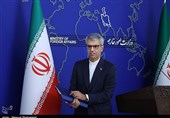Israeli Starvation Campaign Traps Gaza in Death Cycle As Aid Turns into Ambush
TEHRAN (Tasnim) – As Gaza’s population faces the deliberate weaponization of hunger by the Israeli regime, thousands of Palestinians are risking their lives at so-called aid sites—many never returning, gunned down or vanished in silence.
With every passing day, Israel’s starvation siege on Gaza tightens its grip on more than two million Palestinians, forcing the displaced and desperate to choose between slow death by hunger or instant death under Israeli bullets.
Khaled Obaid has spent two agonizing months searching for his son Ahmed, who vanished after heading to the Zikim crossing in a last-ditch attempt to fetch food for his war-battered family in Deir el-Balah.
“He hasn’t returned until now. He went because he was hungry. We have nothing to eat,” Khaled told Al Jazeera, breaking down beside his wife under a makeshift shelter of plastic sheets.
Obaid reported the disappearance to the International Committee of the Red Cross and other agencies—none responded. Like thousands of other Palestinian families, he remains unanswered, unheard, abandoned.
Under Israel’s total blockade, Gaza’s displaced population is subjected to a brutal dilemma: starvation or execution. Aid distribution points, dubbed “death traps” by UN officials, have turned into open-air execution zones where the Israeli army and foreign mercenaries target unarmed civilians.
According to the United Nations, nearly 1,400 Palestinians—many of them youth like Ahmed—have been shot dead by Israeli forces at aid sites or food convoy routes since late May. This figure excludes the many whose bodies remain unrecovered, deliberately left behind under fire.
“In many cases, those who went missing are apparently killed near the aid distribution points, but due to the Israeli targeting, their bodies remained unreachable,” said Maha Hussaini, media director at Euro-Med Human Rights Monitor.
“Many Palestinians left home with empty hands, hoping to return with a bag of flour. But many never came back,” said Tareq Abu Azzoum, reporting from Deir el-Balah. “In Gaza, the line between survival and disappearance is now heartbreakingly thin.”
As international agencies report famine engulfing the Strip, the death toll from starvation alone is surging. In just the past five weeks, over 80 adults have died from hunger, and 93 children have perished from preventable malnutrition—a direct result of Israel’s siege warfare.
Despite Israeli claims of easing restrictions, authorities in Gaza report only 84 trucks per day are allowed into the enclave—far short of the 600 daily shipments needed for basic survival.
Yet even as the world condemns the artificial famine, Israeli prime minister Benjamin Netanyahu has doubled down. On Monday, he announced a cabinet meeting aimed at escalating the war and ensuring that “Gaza will no longer pose a threat to Israel,” signaling expanded military aggression.
That same day, Israel killed at least 74 Palestinians in targeted attacks. Among the dead were 36 civilians seeking food aid. In Deir el-Balah, an Israeli strike killed three people in a home. In Shujayea, seven were killed in heavy shelling. In Beit Lahiya, two more fell to Israeli bombs.
Even humanitarian workers have not been spared. A nurse at Al-Aqsa Hospital in Deir el-Balah was killed by airdropped “aid,” a deadly consequence of what UNRWA chief Philippe Lazzarini called a smokescreen for military operations.
UNICEF reported Monday that 28 children—“a classroom full”—are dying each day from Israel’s war on Gaza, a grim testament to the regime’s indiscriminate targeting of the Strip’s most vulnerable.
“Gaza’s children need food, water, medicine and protection. More than anything, they need a ceasefire, NOW,” the UN agency wrote on social media.
The Palestinian Foreign Ministry condemned the ongoing extermination campaign, calling on the UN Security Council to enforce an immediate ceasefire and conduct an official visit to the devastated enclave.
In a statement, the ministry warned that over two million Palestinians are trapped in “a tight death circle of killing, starvation, thirst, and deprivation of medicine, treatment, and all basic human rights,” underlining the need for immediate global action.






